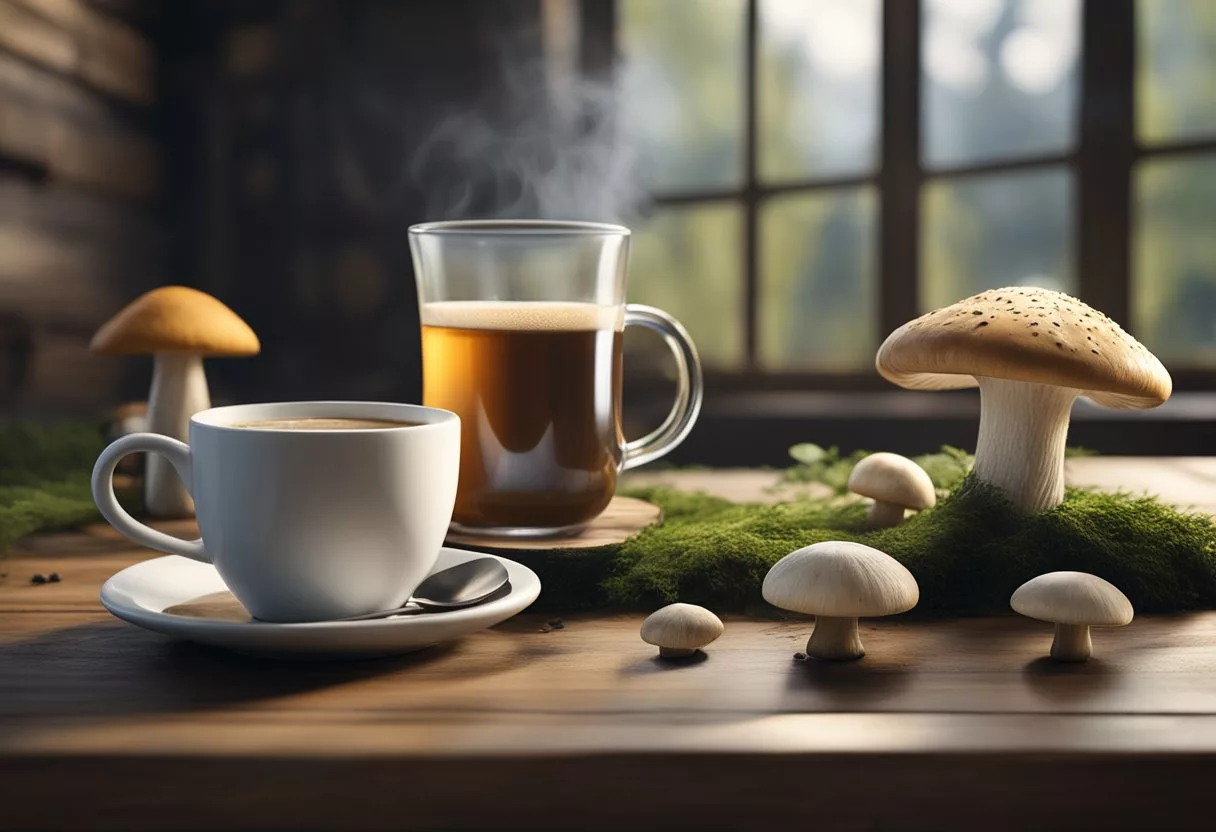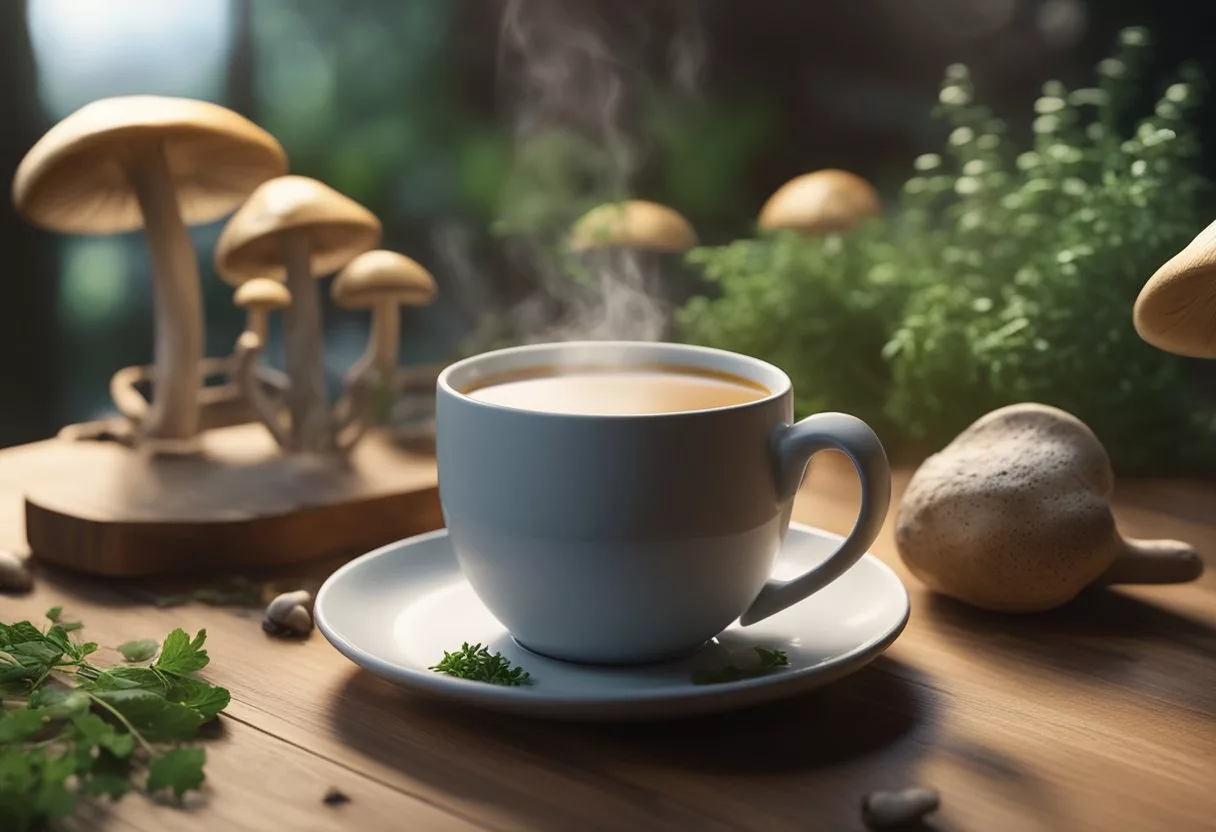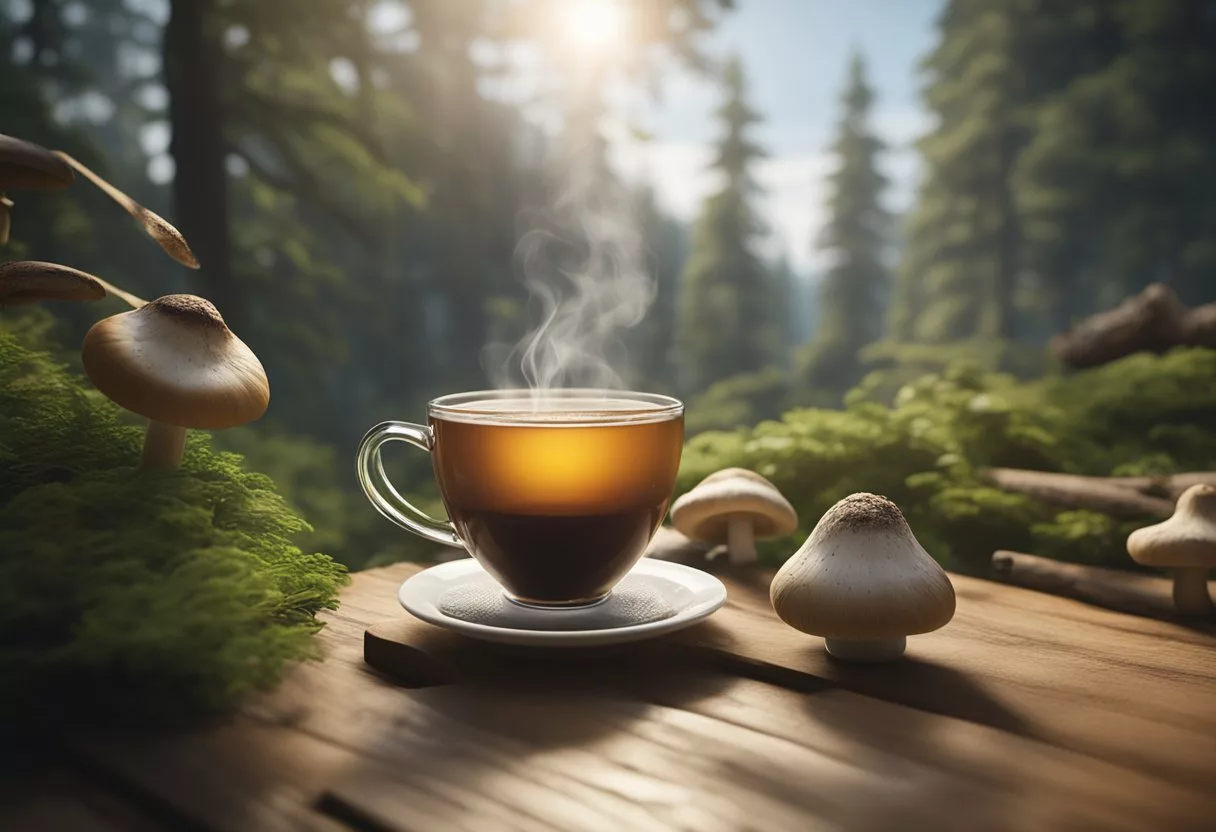Mushroom tea and mushroom coffee are rising stars in the health and wellness world. Each brings its own set of benefits and unique qualities to the table.
Mushroom tea is packed with antioxidants, vitamins, and minerals that can enhance your immune system and overall well-being.
On the other hand, mushroom coffee combines the cognitive-enhancing properties of coffee with the health benefits of medicinal mushrooms. It provides a smoother energy boost with less caffeine.

Mushroom tea offers gentle stress relief and a natural way to support your immune system. It’s perfect for those who enjoy a calming beverage without the jittery effects of caffeine.
Conversely, mushroom coffee delivers a blend of enhanced focus, memory, and creativity. This makes it a great choice for people needing a quick energy lift without the typical coffee jitters.
For those seeking a balance of health benefits and a good taste, both options have something valuable to offer. By understanding the differences between mushroom tea and mushroom coffee, you can choose what best fits your lifestyle and health goals.
Key Takeaways
- Mushroom tea boosts the immune system with antioxidants and vitamins.
- Mushroom coffee combines mental focus benefits with lower caffeine.
- Each offers unique health perks for different lifestyle needs.
Exploring the Basics

Mushroom tea and mushroom coffee offer unique health benefits, from antioxidants to immune system support. Both drinks come from ancient traditions and have specific preparation methods that make them stand out.
What are Mushroom Coffee and Mushroom Tea?
Mushroom coffee combines traditional coffee with medicinal mushrooms like Reishi, Lion’s Mane, and Chaga. This blend can lower caffeine intake while still providing a boost in energy. It’s popular for its potential to reduce stress and improve sleep.
Mushroom tea, on the other hand, is made by steeping dried or powdered mushrooms in hot water. Commonly used varieties include Reishi, Cordyceps, and Chaga. This tea is a caffeine-free alternative, often consumed for its rich antioxidants and immune-boosting properties.
Both drinks can offer different health advantages depending on their ingredients. While mushroom coffee may be more invigorating due to its caffeine content, mushroom tea provides a more holistic wellness approach through its nutrient profile.
Historical Context and Origins
Mushroom tea has roots in Traditional Chinese Medicine. For centuries, mushrooms like Reishi and Chaga have been used to promote health and longevity in China. These medicinal mushrooms were brewed into teas and tonics as natural remedies.
Mushroom coffee has a more modern history. It gained popularity during World War II in Finland when coffee beans were scarce. People started using Chaga mushrooms as a coffee substitute. Since then, the beverage has evolved to include various medicinal mushrooms combined with coffee.
Today, both mushroom tea and mushroom coffee have gained a global following. Their unique benefits and historical significance make them popular choices for health-conscious individuals around the world.
For more on the benefits of mushroom coffee, visit Cleveland Clinic Health. To explore the traditional uses of mushroom tea, check out Mr. Mushroom.
Comparative Analysis of Mushroom Tea and Coffee

Mushroom tea and coffee offer unique health benefits and flavor experiences. Each option has its own ingredients, nutritional profiles, and preparation methods.
Nutritional Profiles and Ingredients
Mushroom tea is made using various types of medicinal mushrooms such as shiitake, reishi, chaga, and lion’s mane. These mushrooms are known for their rich content of antioxidants, vitamins, and minerals. Drinking mushroom tea can enhance the immune system and provide anti-inflammatory benefits.
On the other hand, mushroom coffee combines traditional coffee beans with ground mushrooms. This blend contains cognitive-enhancing properties, improving focus and memory. Mushroom coffee has lower caffeine levels than regular coffee, reducing jitters and anxiety. Both drinks offer different but complementary health advantages.
| Feature | Mushroom Tea | Mushroom Coffee |
|---|---|---|
| Main Ingredients | Medicinal mushrooms | Coffee beans and ground mushrooms |
| Key Benefits | Immune boost, anti-inflammatory properties | Focus, memory enhancement, reduced caffeine levels |
Flavor and Preparation Methods
Mushroom tea often has an earthy, sometimes bitter flavor that can be an acquired taste. It is usually prepared by steeping mushroom pieces or powders in hot water for several minutes. Some people add honey or lemon to improve the taste.
In contrast, mushroom coffee retains much of the coffee taste but with subtle mushroom undertones. It’s prepared similarly to regular coffee, either by brewing ground coffee mixed with mushroom powder or using instant coffee blends. The addition of mushrooms doesn’t drastically change the flavor but adds depth and complexity.
| Preparation | Mushroom Tea | Mushroom Coffee |
|---|---|---|
| Flavor Profile | Earthy, sometimes bitter | Coffee with mild mushroom undertones |
| Preparation Time | Steeping for several minutes | Brewed like regular coffee or made instantly with mushroom mix |
Health Benefits and Wellness

Mushroom tea and mushroom coffee both bring unique health benefits. They are rich in antioxidants and can improve immune function, mental health, and chronic disease prevention.
Boosting Immune System and Anti-Inflammatory Effects
Medicinal mushrooms like reishi, turkey tail, and cordyceps are often used in mushroom teas. They enhance immune function and have strong anti-inflammatory properties. These mushrooms help reduce inflammation and support overall health.
Reishi is known for its immune-boosting effects. Meanwhile, turkey tail has been researched for its potential to support cancer treatment and promote gut health. Cordyceps may improve immune response and reduce inflammation, making them effective in fighting common illnesses. Adding these mushrooms to tea can offer significant health benefits.
Cognitive Function and Mental Health
Lion’s mane is a popular choice in both mushroom tea and coffee due to its cognitive-enhancing properties. This functional mushroom is known to support brain health, improve memory, and enhance focus. Studies suggest that lion’s mane stimulates nerve growth, which can help with cognitive decline and neurodegenerative diseases.
Mushroom coffee also contains caffeine, which can improve alertness and concentration. When combined with lion’s mane, it can provide a balanced mental boost without the jitters associated with regular coffee. Drinking mushroom tea or coffee can support mental clarity and overall brain function.
Antioxidants and Chronic Disease Prevention
Both mushroom tea and mushroom coffee are rich in antioxidants, which help prevent cellular damage caused by free radicals.
Antioxidants like ergothioneine are abundant in medicinal mushroom extracts and can reduce oxidative stress.
Reishi, known for its longevity benefits, contains potent antioxidants that support heart health and may lower the risk of chronic diseases like heart disease and cancer.
Ergothioneine, found in mushrooms like cordyceps and reishi, provides protection against cellular damage. These antioxidants can neutralize free radicals, reduce oxidative stress, and support overall well-being. Drinking mushroom tea or coffee is a simple way to incorporate these health-promoting compounds into your daily routine.
Understanding Caffeine Content

Both mushroom coffee and mushroom tea offer unique benefits related to their caffeine content. Caffeine impacts energy levels, focus, and more, and understanding these effects can help you decide which beverage is better for you.
Effects of Caffeine on Body and Mind
Caffeine is a stimulant that affects the central nervous system. It helps improve focus and alertness. Consuming caffeine also boosts energy levels and can enhance physical performance.
Positive effects include:
- Increased alertness and concentration
- Enhanced physical performance
- Temporary mood elevation
Negative effects can involve:
- Jitteriness and anxiety
- Difficulty sleeping
- Potential for addiction
Caffeine affects everyone differently. It’s crucial to monitor how your body responds. This is especially important if you consume other caffeinated products like regular coffee, tea, or certain sodas.
Comparing Caffeine Levels in Mushroom Coffee and Tea
Mushroom coffee typically contains less caffeine than regular coffee. The addition of mushrooms lowers the total caffeine content, which reduces the risk of jitteriness and anxiety.
Caffeine content comparison:
- Regular coffee: ~95 mg per cup
- Mushroom coffee: ~50 mg per cup
- Mushroom tea: varies, but generally contains less caffeine than mushroom coffee
Mushroom tea often offers a gentler, more prolonged energy boost. This can make it a preferred choice for those sensitive to caffeine.
For those needing a more sustained energy release throughout the day, mushroom tea may be the better option. Meanwhile, mushroom coffee still provides an energy boost but with fewer jittery side effects compared to regular coffee.
Side Effects and Considerations

When choosing between mushroom tea and mushroom coffee, it is important to consider potential side effects and how to consume these beverages responsibly. Both drinks come with unique benefits and possible health risks.
Potential Downsides and Health Risks
Mushroom coffee and mushroom tea might lead to side effects depending on individual sensitivity. Some mushrooms, such as reishi and chaga, contain oxalates, which can contribute to kidney issues in susceptible individuals. Additionally, certain mushrooms might interfere with blood-thinning medications.
People with pre-existing liver conditions should be cautious. Overconsumption of mushrooms like chaga can affect liver health due to their high oxalate content. Those who are pregnant, nursing, or managing chronic health conditions should consult their healthcare provider before adding these beverages to their routine.
How to Consume Responsibly
To enjoy the benefits of mushroom tea and coffee while minimizing risks, it is wise to start with small amounts. Gradually increase intake to assess tolerance.
Choose products from reputable brands to ensure quality and purity.
Reading labels and understanding ingredient lists can prevent allergic reactions or adverse effects. Consulting a healthcare provider before incorporating either beverage, especially if there are existing health concerns, is a good practice.
Balancing these drinks with a varied diet and not relying solely on them for health benefits can help maintain overall well-being. Moderation and vigilance are key to safely enjoying mushroom beverages.
Economic and Environmental Factors

Both mushroom tea and mushroom coffee have unique economic and environmental impacts. Factors like cost, cultivation methods, and sustainability play significant roles in their overall influence.
Cost Comparison Between Mushroom Tea and Coffee
Mushroom tea is typically made from dried or powdered mushrooms, with common types including Maitake, Reishi and Chaga. The cost of mushroom tea can vary, but it is often considered affordable compared to many specialty beverages. Using fresh mushrooms or mushroom powder can be more economical over time, especially if bought in bulk.
Mushroom coffee usually combines regular coffee with mushroom extract. The added ingredients and processing can make it more expensive than standard coffee. High-quality mushroom coffee tends to cost more due to the extraction process and the use of premium supplements.
Comparing the two, mushroom tea might be more budget-friendly, especially when opting for simpler forms like tea bags or loose powder. Mushroom coffee, while pricier, offers a convenient blend of the benefits of both coffee and mushrooms in one cup.
Sustainability and Ethical Considerations
Sustainability is a key factor when looking at both beverages. Mushroom cultivation generally has a lower environmental impact compared to traditional coffee farming. Mushrooms can grow on agricultural and forest waste, reducing the need for fresh resources and energy.
Ethical considerations also come into play. The production of mushroom tea often involves fewer pesticides and chemicals compared to coffee plantations. This can result in lower soil depletion and better preservation of ecosystems.
In terms of green tea, which is sometimes used as a base for mushroom tea, it also has a relatively low environmental footprint. The use of mushrooms as a supplement in beverages promotes biodiversity and can lead to more sustainable agricultural practices.
Consumer Experience and Lifestyle Benefits

Mushroom tea and mushroom coffee each offer distinct benefits that appeal to different aspects of consumer lifestyle and wellbeing.
Integrating into Daily Routine for Enhanced Wellbeing
Mushroom tea is often chosen for its role in promoting relaxation and improved immunity. It’s caffeine-free, making it a healthier alternative for those seeking an energy boost without jitters. Ingredients like reishi and chaga can support heart health and a calm mind.
Mushroom coffee, on the other hand, provides sustained energy and improved concentration. Varieties infused with hericium erinaceus (Lion’s Mane) are popular for enhancing mood and mental clarity. Both beverages can be easily integrated into daily routines, whether as a morning start or an afternoon pick-me-up.
Social Perception and Trends
Social media has played a significant role in popularizing both mushroom tea and mushroom coffee. Influencers often highlight their benefits for wellness and balanced living. Mushroom coffee is perceived as a modern trend, appealing to those seeking performance and cognitive benefits in a convenient form.
Mushroom tea appeals to consumers interested in traditional remedies and natural wellness. Its image is often associated with detox routines and holistic health practices. Both drinks fit into the broader trend of finding healthier alternatives to conventional beverages loaded with sugar and artificial ingredients.
Additional Insights

When comparing mushroom tea and mushroom coffee, understanding the role of adaptogens and the different extraction methods can be crucial. This knowledge helps determine how much of the nutritional benefits one can actually receive from each beverage.
The Role of Adaptogens in Mushroom Varieties
Adaptogens, found in various mushrooms, help the body manage stress. Adaptogenic mushrooms like reishi (Ganoderma lucidum) are popular for their potential health benefits.
Reishi mushrooms are renowned for their immune support properties. They contain beta-glucans, which are known to boost the immune system. Additionally, these mushrooms are rich in vitamins and minerals.
Mushroom tea often includes reishi for its calming effects and digestive benefits. On the other hand, mushroom coffee may combine different adaptogens to enhance focus and reduce caffeine’s side effects, offering a balanced energy boost.
Extraction Methods and Bioavailability
The extraction method impacts the bioavailability of the beneficial compounds in mushrooms. Bioavailability refers to how much of a substance can be absorbed and used by the body.
Hot water extraction is a common method for making mushroom tea. This process extracts polysaccharides, like beta-glucans. Beta-glucans are beneficial for the immune system.
Ethanol extraction, seen in some mushroom coffee, pulls out the triterpenes. Triterpenes are known for their anti-inflammatory properties. This combination makes mushroom coffee a potent choice for those seeking both energy and health benefits.
Different methods may affect the nutritional output. So, considering the extraction type is essential when choosing between mushroom tea and coffee.
Frequently Asked Questions

Mushroom tea and mushroom coffee both offer unique health benefits, nutritional content, and side effects. They differ in how they interact with the body and how they are prepared and consumed.
What are the distinguishing health benefits of mushroom tea compared to mushroom coffee?
Mushroom tea is often made with medicinal mushrooms like Reishi and Chaga, known for boosting the immune system. Mushroom coffee is marketed as reducing stress and improving sleep. Key benefits depend on the type of mushrooms used.
How does the nutrient content vary between mushroom tea and mushroom coffee?
Mushroom tea is rich in antioxidants, vitamins, and minerals. Meanwhile, mushroom coffee contains these nutrients when made from high-quality mushroom extracts but also includes caffeine. The specific nutrients depend on the mushrooms and preparation method.
Can mushroom coffee provide the same level of weight loss benefits as mushroom tea?
There is no strong evidence that mushroom coffee offers significant weight loss benefits. Mushroom tea’s benefits also vary, with some antioxidants potentially aiding in metabolism. More research is needed to substantiate these claims.
What are the potential side effects associated with drinking mushroom coffee?
Possible side effects of drinking mushroom coffee include dizziness, itching, dry mouth, nausea, stomach upset, and rash. These symptoms are usually related to specific types of mushrooms, like Reishi, and individuals’ sensitivities to them.
How does mushroom tea impact the body differently than mushroom coffee?
Mushroom tea provides a caffeine-free option, beneficial for those avoiding stimulants. Meanwhile, mushroom coffee contains less caffeine than regular coffee but still provides an energy boost. The body’s response will depend on the individual’s caffeine tolerance and health goals.
In terms of flavor and preparation, how do mushroom tea and coffee compare?
Mushroom tea is typically steeped in hot water. This method focuses on the medicinal properties of the mushrooms. On the other hand, mushroom coffee is brewed like regular coffee. It is often made with a mix of coffee beans and mushroom extracts.
The flavor of mushroom coffee is smoother, with an earthy taste. Meanwhile, mushroom tea offers a more herbal and sometimes bitter flavor.